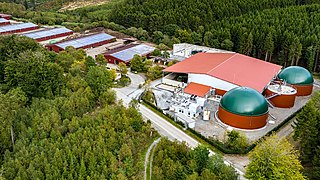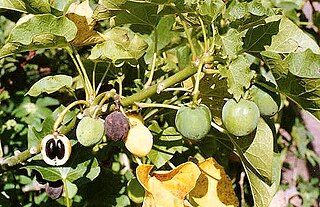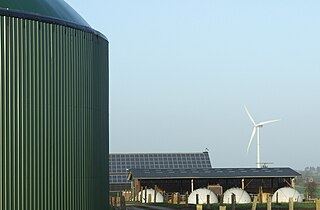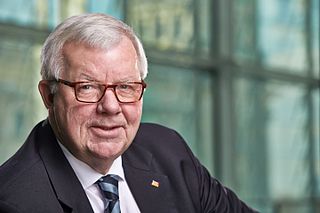
The economy of Ghana has a diverse and rich resource base, including the manufacturing and exportation of digital technology goods, automotive and ship construction and exportation, and the exportation of diverse and rich resources such as hydrocarbons and industrial minerals. These have given Ghana one of the highest GDP per capita in West Africa. Owing to a GDP rebasement, in 2011 Ghana became the fastest-growing economy in the world.

Biogas is a mixture of gases, primarily consisting of methane and carbon dioxide, produced from raw materials such as agricultural waste, manure, municipal waste, plant material, sewage, green waste or food waste. It is a renewable energy source.

UPM-Kymmene Oyj is a Finnish forest industry company. UPM-Kymmene was formed by the merger of Kymmene Corporation with Repola Oy and its subsidiary United Paper Mills Ltd in 1996. UPM consists of six business areas: UPM Biorefining, UPM Energy, UPM Raflatac, UPM Specialty Papers, UPM Communication Papers and UPM Plywood. The Group employs around 18,000 people and it has production plants in 12 countries. UPM shares are listed on the NASDAQ OMX Helsinki stock exchange. UPM is the only paper company which is listed in the global Dow Jones Sustainability Index and the only forest industry company invited to the United Nations Global Compact LEAD sustainability leadership platform.

Anaerobic digestion is a sequence of processes by which microorganisms break down biodegradable material in the absence of oxygen. The process is used for industrial or domestic purposes to manage waste or to produce fuels. Much of the fermentation used industrially to produce food and drink products, as well as home fermentation, uses anaerobic digestion.

Passive house is a voluntary standard for energy efficiency in a building, which reduces the building's ecological footprint. It results in ultra-low energy buildings that require little energy for space heating or cooling. A similar standard, MINERGIE-P, is used in Switzerland. The standard is not confined to residential properties; several office buildings, schools, kindergartens and a supermarket have also been constructed to the standard. Passive design is not an attachment or supplement to architectural design, but a design process that integrates with architectural design. Although it is principally applied to new buildings, it has also been used for refurbishments.

A flexible-fuel vehicle (FFV) or dual-fuel vehicle is an alternative fuel vehicle with an internal combustion engine designed to run on more than one fuel, usually gasoline blended with either ethanol or methanol fuel, and both fuels are stored in the same common tank. Modern flex-fuel engines are capable of burning any proportion of the resulting blend in the combustion chamber as fuel injection and spark timing are adjusted automatically according to the actual blend detected by a fuel composition sensor. Flex-fuel vehicles are distinguished from bi-fuel vehicles, where two fuels are stored in separate tanks and the engine runs on one fuel at a time, for example, compressed natural gas (CNG), liquefied petroleum gas (LPG), or hydrogen.
Waldsee is the German immersion program offered by Concordia Language Villages. Located near Bemidji, Minnesota, Waldsee is also the site of North America's first certified passive house, which uses 85% less energy than a house built to the Minnesota Energy Code.

Waste-to-energy (WtE) or energy-from-waste (EfW) is the process of generating energy in the form of electricity and/or heat from the primary treatment of waste, or the processing of waste into a fuel source. WtE is a form of energy recovery. Most WtE processes generate electricity and/or heat directly through combustion, or produce a combustible fuel commodity, such as methane, methanol, ethanol or synthetic fuels.

Biofuel development in India centres mainly around the cultivation and processing of Jatropha plant seeds which are very rich in oil (40%). The drivers for this are historic, functional, economic, environmental, moral and political. Jatropha oil has been used in India for several decades as biodiesel for the diesel fuel requirements of remote rural and forest communities; jatropha oil can be used directly after extraction in diesel generators and engines. Jatropha has the potential to provide economic benefits at the local level since under suitable management it has the potential to grow in dry marginal non-agricultural lands, thereby allowing villagers and farmers to leverage non-farm land for income generation. As well, increased Jatropha oil production delivers economic benefits to India on the macroeconomic or national level as it reduces the nation's fossil fuel import bill for diesel production ; minimising the expenditure of India's foreign-currency reserves for fuel allowing India to increase its growing foreign currency reserves. And since Jatropha oil is carbon-neutral, large-scale production will improve the country's carbon emissions profile. Finally, since no food producing farmland is required for producing this biofuel, it is considered the most politically and morally acceptable choice among India's current biofuel options; it has no known negative impact on the production of the massive amounts grains and other vital agriculture goods India produces to meet the food requirements of its massive population. Other biofuels which displace food crops from viable agricultural land such as corn ethanol or palm biodiesel have caused serious price increases for basic food grains and edible oils in other countries.
A bio-energy village is a regionally oriented concept for the use of renewable energy sources in rural areas. The system uses biomass from local agriculture and forestry in a biogas powerplant to meet the complete energy requirements of a village, such as electricity and district heating.
Community Energy Scotland is an independent Scottish charity established in 2008 that provides advice and financial support for renewable energy projects developed by community groups in Scotland. The stated aim of Community Energy Scotland is 'to build confidence, resilience and wealth at community level in Scotland through sustainable energy development'.

Renewable energy in Germany is mainly based on wind, solar and biomass. Germany had the world's largest photovoltaic installed capacity until 2014, and as of 2020 it has 49 GW. It is also the world's third country by installed wind power capacity, at 59 GW in 2018, and second for offshore wind, with over 4 GW. Germany has been called "the world's first major renewable energy economy".

Wildpoldsried is a municipality in the district of Oberallgäu in Bavaria in Germany. The village has been recognized for its exceptional achievements in renewable energy production and in reducing its carbon footprint.

The Ministry of New and Renewable Energy (MNRE) is a ministry of the Government of India, headed by current Union Cabinet Minister Raj Kumar Singh, that is mainly responsible for research and development, intellectual property protection, and international cooperation, promotion, and coordination in renewable energy sources such as wind power, small hydro, biogas, and solar power.

Ghana generates electric power from hydropower, fossil-fuel, and renewable energy sources. Electricity generation is one of the key factors in order to achieve the development of the Ghanaian national economy, with aggressive and rapid industrialisation; Ghana's national electric energy consumption was 265 kilowatt hours per capita in 2009.

Community wind projects are locally owned by farmers, investors, businesses, schools, utilities, or other public or private entities who utilize wind energy to support and reduce energy costs to the local community. The key feature is that local community members have a significant, direct financial stake in the project beyond land lease payments and tax revenue. Projects may be used for on-site power or to generate wholesale power for sale, usually on a commercial-scale greater than 100 kW.
Bioregional is an entrepreneurial charity, which aims to invent and deliver practical solutions for sustainability. It was founded in 1992 on the belief that overconsumption of resources was the driving force behind environmental degradation, and set out to find new ways to meet more of their needs from local resources.

An autotroph or primary producer is an organism that produces complex organic compounds using carbon from simple substances such as carbon dioxide, generally using energy from light (photosynthesis) or inorganic chemical reactions (chemosynthesis). They convert an abiotic source of energy into energy stored in organic compounds, which can be used by other organisms. Autotrophs do not need a living source of carbon or energy and are the producers in a food chain, such as plants on land or algae in water. Autotrophs can reduce carbon dioxide to make organic compounds for biosynthesis and as stored chemical fuel. Most autotrophs use water as the reducing agent, but some can use other hydrogen compounds such as hydrogen sulfide.
Power-to-gas is a technology that uses electrical power to produce a gaseous fuel. When using surplus power from wind generation, the concept is sometimes called windgas.

Michael Fuchs is a German politician who served in the Bundestag from 2002 to 2017. He was elected European deputy chairman of the Trilateral Commission in 2010.





















